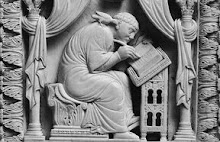Gold or Yellow (Or): Generosity, wealth and elevation of the mind
Silver or White (Argent): Peace, sincerity and faith
Black (Sable): Constancy or grief; mystery
Red (Gules): Warrior or martyr; Military fortitude and generosity of spirit
Blue (Azure): Truth and loyalty; honesty
Green (Vert): Hope, joy, and sometimes loyalty in love; prosperity
Purple (Purpure): Royal majesty, sovereignty, and justice
Orange (Tawny or Tenne): Worthy ambition, desire
Maroon (Sanguine or Murray): Patient, or not hasty, in battle and yet victorious
Saturday, January 31, 2009
One in Biblical Theology
Oneness is a quality of God and is a symbol of unity.
The Shema says: “Hear, O Israel: The Lord our God, the Lord is one.” (Deut 6:4)
“First, God is the only God. Other gods have no right whatsoever. They must not be worshipped (Ex 20:1-6). God has created heaven and earth (Gen 1)…God’s reign is unrestricted by time and place.
“Second, there is only one God for all people…
“Third, there are no gradations in deity.”
Quote from Dictionary of Biblical Imagery edited by Leland Ryken, James C. Wilhoit, Tremper Longman III
The Shema says: “Hear, O Israel: The Lord our God, the Lord is one.” (Deut 6:4)
“First, God is the only God. Other gods have no right whatsoever. They must not be worshipped (Ex 20:1-6). God has created heaven and earth (Gen 1)…God’s reign is unrestricted by time and place.
“Second, there is only one God for all people…
“Third, there are no gradations in deity.”
Quote from Dictionary of Biblical Imagery edited by Leland Ryken, James C. Wilhoit, Tremper Longman III
Friday, January 30, 2009
Seeking and Finding
“There is nothing like looking, if you want to find something. You certainly usually find something, if you look, but it is not always quite the something you were after.”
--J.R.R. Tolkien
--J.R.R. Tolkien
On the Dyad
From The Theology of Arithmetic by Iamblichus (4th century A.D.)
Among the virtues, they liken [the dyad] to courage: for it has already advanced into action. Hence too they call it ‘daring’ and ‘impulse.’
The dyad is all but contrasted to the nature of God in the sense that it is considered to be the cause of things changing and altering, while God is the cause of sameness and unchanging stability.
Among the virtues, they liken [the dyad] to courage: for it has already advanced into action. Hence too they call it ‘daring’ and ‘impulse.’
The dyad is all but contrasted to the nature of God in the sense that it is considered to be the cause of things changing and altering, while God is the cause of sameness and unchanging stability.
Children and Dragons
Fairy tales do not tell children the dragons exist. Children already know that dragons exist. Fairy tales tell children the dragons can be killed.
--G.K. Chesterton
--G.K. Chesterton
On the Monad
From The Theology of Arithmetic by Iamblichus (4th century A.D.)
Everything has been organized by the monad, because it contains everything potentially: for even if they are not yet actual, nevertheless the monad holds seminally the principals which are within all numbers, including those which are within the dyad…it is demonstrably…beginning, middle and end of all things…
Just as without the monad there is in general no composition of anything, so also without it there is no knowledge of anything whatsoever, since it is a pure light, most authoritative over everything in general, and it is sun-like and ruling, so that in each of these respects it resembles God, and especially because it has the power of making things cohere and combine, even when they are composed of many ingredients and are very different from on another, just as he made this universe harmonious and unified out of things which are likewise opposed.
Everything has been organized by the monad, because it contains everything potentially: for even if they are not yet actual, nevertheless the monad holds seminally the principals which are within all numbers, including those which are within the dyad…it is demonstrably…beginning, middle and end of all things…
Just as without the monad there is in general no composition of anything, so also without it there is no knowledge of anything whatsoever, since it is a pure light, most authoritative over everything in general, and it is sun-like and ruling, so that in each of these respects it resembles God, and especially because it has the power of making things cohere and combine, even when they are composed of many ingredients and are very different from on another, just as he made this universe harmonious and unified out of things which are likewise opposed.
Subscribe to:
Posts (Atom)
